Connect With Us
Blog
Items filtered by date: November 2022
Drinking Water and Exercising May Help Swollen Feet During Pregnancy
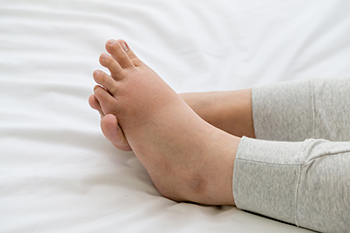
Swollen feet and ankles are common among the majority of women during pregnancy. This is a condition that generally begins during the second trimester, and continues throughout the pregnancy. Swollen feet are caused by excess fluid the body produces for the growing fetus, and it can collect in the feet. Relief may be found when the feet are frequently elevated, and sodium intake is reduced. Additionally, the swelling may become worse during the warmer months, and it is beneficial to stay as cool as possible. Research has shown that drinking plenty of water daily may help to control the swelling, in addition to wearing comfortable shoes and socks. The feet will typically feel better when gentle foot exercises are performed, consisting of bending and stretching them up and down several times. If you have questions about how the feet are affected during pregnancy, please consult with a podiatrist who can address any concerns you may have.
Pregnant women with swollen feet can be treated with a variety of different methods that are readily available. For more information about other cures for swollen feet during pregnancy, consult with one of our podiatrists from Comprehensive Foot & Ankle Centers. Our doctors will attend to all of your foot and ankle needs.
What Foot Problems Can Arise During Pregnancy?
One problem that can occur is overpronation, which occurs when the arch of the foot flattens and tends to roll inward. This can cause pain and discomfort in your heels while you’re walking or even just standing up, trying to support your baby.
Another problem is edema, or swelling in the extremities. This often affects the feet during pregnancy but tends to occur in the later stages.
How Can I Keep My Feet Healthy During Pregnancy?
- Wearing orthotics can provide extra support for the feet and help distribute weight evenly
- Minimize the amount of time spent walking barefoot
- Wear shoes with good arch support
- Wear shoes that allow for good circulation to the feet
- Elevate feet if you experience swelling
- Massage your feet
- Get regular, light exercise, such as walking, to promote blood circulation to the feet
If you have any questions please feel free to contact our offices located in Shepherdsville and Louisville, KY . We offer the newest diagnostic and treatment technologies for all your foot and ankle needs.
Risk Factors of Foot Pain
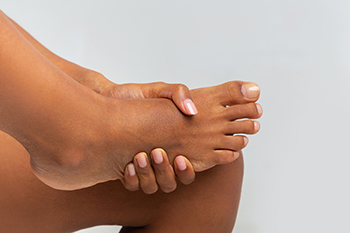
Foot pain can be an extreme annoyance for a variety of individuals across the country of all ages and backgrounds. Importantly, there are critical risk factors that can be associated with foot pain. These risk factors can make foot pain more likely. For example, if an individual has arthritis, they may be at an increased risk of experiencing foot pain of some kind. This can include osteoarthritis, Rheumatoid arthritis, juvenile arthritis, and gout, among other things. Additionally, overuse of the feet is a significant risk factor that may increase one’s susceptibility to overuse injuries in the feet. Lastly, conditions causing inflammation in the feet may be a significant risk factor for foot pain. If you have foot pain or are worried about developing foot pain, contact a podiatrist today for more information.
Foot Pain
Foot pain can be extremely painful and debilitating. If you have a foot pain, consult with one of our podiatrists from Comprehensive Foot & Ankle Centers. Our doctors will assess your condition and provide you with quality foot and ankle treatment.
Causes
Foot pain is a very broad condition that could be caused by one or more ailments. The most common include:
- Bunions
- Hammertoes
- Plantar Fasciitis
- Bone Spurs
- Corns
- Tarsal Tunnel Syndrome
- Ingrown Toenails
- Arthritis (such as Gout, Rheumatoid, and Osteoarthritis)
- Flat Feet
- Injury (from stress fractures, broken toe, foot, ankle, Achilles tendon ruptures, and sprains)
- And more
Diagnosis
To figure out the cause of foot pain, podiatrists utilize several different methods. This can range from simple visual inspections and sensation tests to X-rays and MRI scans. Prior medical history, family medical history, and any recent physical traumatic events will all be taken into consideration for a proper diagnosis.
Treatment
Treatment depends upon the cause of the foot pain. Whether it is resting, staying off the foot, or having surgery; podiatrists have a number of treatment options available for foot pain.
If you have any questions, please feel free to contact our offices located in Shepherdsville and Louisville, KY . We offer the newest diagnostic and treatment technologies for all your foot care needs.
Reminder: When Was the Last Time...?
Types of Foot Surgery
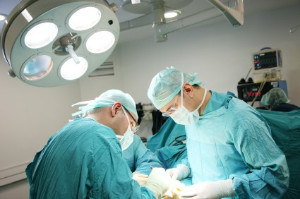
The feet are a complicated part of our bodies. Each foot consists of 26 bones, 33 joints, and many tendons, ligaments, and muscles. A variety of conditions can affect the feet and cause discomfort, which can limit mobility. At times things happen to change the structure and mechanics of the foot and surgery may be required. Foot surgery is typically considered when more conservative approaches do not work. It is often done to reduce pain, correct a deformity, or restore foot functioning. Some examples of foot surgery include bunion surgery, hammertoe surgery, and heel surgery. If you suffer from foot pain that is not relieved by rest or a change of shoes, see a podiatrist for an evaluation and treatment. Foot surgery can usually be prevented if problems are treated in a timely manner.
Foot surgery is sometimes necessary to treat a foot ailment. To learn more, contact one of our podiatrists of Comprehensive Foot & Ankle Centers. Our doctors will assist you with all of your foot and ankle needs.
When Is Surgery Necessary?
Foot and ankle surgery is generally reserved for cases in which less invasive, conservative procedures have failed to alleviate the problem. Some of the cases in which surgery may be necessary include:
- Removing foot deformities like bunions and bone spurs
- Severe arthritis that has caused bone issues
- Cosmetic reconstruction
What Types of Surgery Are There?
The type of surgery you receive will depend on the nature of the problem you have. Some of the possible surgeries include:
- Bunionectomy for painful bunions
- Surgical fusion for realignment of bones
- Neuropathy decompression surgery to treat nerve damage
Benefits of Surgery
Although surgery is usually a last resort, it can provide more complete pain relief compared to non-surgical methods and may allow you to finally resume full activity.
Surgical techniques have also become increasingly sophisticated. Techniques like endoscopic surgery allow for smaller incisions and faster recovery times.
If you have any questions please feel free to contact our offices located in Shepherdsville and Louisville, KY . We offer the newest diagnostic and treatment technologies for all your foot and ankle needs.
Foot Care Tips That May Help to Protect the Feet
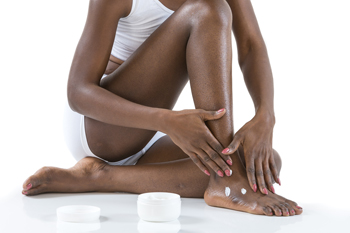
The majority of people may understand the need to take care of their bodies, but may neglect their feet. They carry the weight of the body, and daily care is needed to help prevent the feet from developing unwanted conditions. There are simple and effective methods that can help to pamper and protect the feet, and it is beneficial if they are incorporated into everyday practice. The feet will feel good when they are washed and dried daily, followed by applying a good moisturizer. Ingrown toenails may be avoided when the toenails are trimmed properly, and this is generally done on a weekly basis. It is beneficial to wear appropriate shoes while in places such as public swimming pools and locker rooms, as this may possibly prevent athlete's foot and toenail fungus from developing. Environments of this type are where the fungus that causes these foot conditions live, and flip-flops or water shoes are encouraged to be worn while frequenting them. Additionally, wearing shoes that fit correctly may help to prevent a multitude of foot conditions. If you would like more information about simple everyday foot care tips, please consult with a podiatrist.
Everyday foot care is very important to prevent infection and other foot ailments. If you need your feet checked, contact one of our podiatrists from Comprehensive Foot & Ankle Centers. Our doctors can provide the care you need to keep you pain-free and on your feet.
Everyday Foot Care
Often, people take care of their bodies, face and hair more so than they do for their feet. But the feet are a very important aspect of our bodies, and one that we should pay more attention to. Without our feet, we would not be able to perform most daily tasks.
It is best to check your feet regularly to make sure there are no new bruises or cuts that you may not have noticed before. For dry feet, moisturizer can easily be a remedy and can be applied as often as necessary to the affected areas. Wearing shoes that fit well can also help you maintain good foot health, as well as making it easier to walk and do daily activities without the stress or pain of ill-fitting shoes, high heels, or even flip flops. Wearing clean socks with closed shoes is important to ensure that sweat and bacteria do not accumulate within the shoe. Clean socks help to prevent Athlete’s foot, fungi problems, bad odors, and can absorb sweat.
If you have any questions please feel free to contact our offices located in Shepherdsville and Louisville, KY . We offer the newest diagnostic and treatment technologies for all your foot and ankle needs.
High Heels Can Lead to Morton’s Neuroma
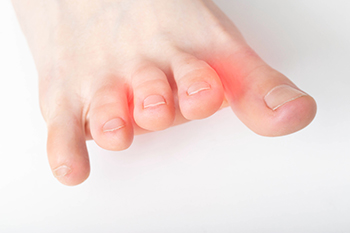
Morton’s neuroma is a painful foot condition that affects women more than men. It may develop from frequently wearing high heels and occurs in the nerve between the third and fourth toes. Many high heels do not have adequate room for the toes to move freely in and this can cause the nerve to become compressed. Common symptoms associated with Morton’s neuroma can include the sensation of stepping on a pebble or marble, numbness, or stabbing pain surrounding the affected area. Relief may be found when the foot is elevated and when soft insoles are worn inside the shoe. Patients who are overweight are encouraged to lose any additional weight to help reduce the pressure on the feet. It is also suggested to refrain from participating in running and jumping activities, and this may help accelerate the healing process. In severe cases, surgery may be required to permanently repair or remove the affected nerve for maximum comfort. If you have this foot condition, please consult a podiatrist who can effectively diagnose and treat Morton’s neuroma.
Morton’s neuroma is a very uncomfortable condition to live with. If you think you have Morton’s neuroma, contact one of our podiatrists of Comprehensive Foot & Ankle Centers. Our doctors will attend to all of your foot care needs and answer any of your related questions.
Morton’s Neuroma
Morton's neuroma is a painful foot condition that commonly affects the areas between the second and third or third and fourth toe, although other areas of the foot are also susceptible. Morton’s neuroma is caused by an inflamed nerve in the foot that is being squeezed and aggravated by surrounding bones.
What Increases the Chances of Having Morton’s Neuroma?
- Ill-fitting high heels or shoes that add pressure to the toe or foot
- Jogging, running or any sport that involves constant impact to the foot
- Flat feet, bunions, and any other foot deformities
Morton’s neuroma is a very treatable condition. Orthotics and shoe inserts can often be used to alleviate the pain on the forefront of the feet. In more severe cases, corticosteroids can also be prescribed. In order to figure out the best treatment for your neuroma, it’s recommended to seek the care of a podiatrist who can diagnose your condition and provide different treatment options.
If you have any questions, please feel free to contact our offices located in Shepherdsville and Louisville, KY . We offer the newest diagnostic and treatment technologies for all your foot care needs.
Blog Archives
- August 2025
- July 2025
- June 2025
- May 2025
- April 2025
- March 2025
- February 2025
- January 2025
- December 2024
- November 2024
- October 2024
- September 2024
- August 2024
- July 2024
- June 2024
- May 2024
- April 2024
- March 2024
- February 2024
- January 2024
- December 2023
- November 2023
- October 2023
- September 2023
- August 2023
- July 2023
- June 2023
- May 2023
- April 2023
- March 2023
- February 2023
- January 2023
- December 2022
- November 2022
- October 2022
- September 2022
- August 2022
- July 2022
- June 2022
- May 2022
- April 2022
- March 2022
- February 2022
- January 2022
- December 2021
- November 2021
- October 2021
- September 2021
- August 2021
- July 2021
- June 2021
- May 2021
- April 2021
- February 2021
- January 2021
- December 2020

